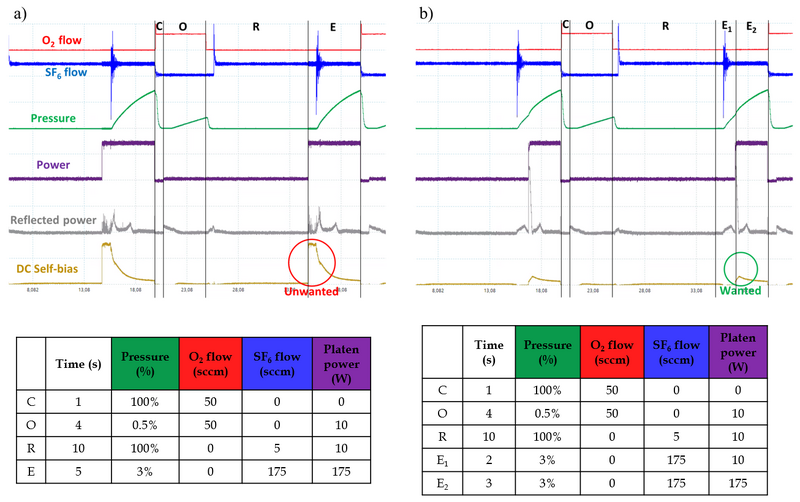Specific Process Knowledge/Etch/DRIE-Pegasus/Pegasus-2/ORE with Al2O3 mask: Difference between revisions
| Line 3: | Line 3: | ||
=<span style="background:#FF2800">THIS PAGE IS UNDER CONSTRUCTION</span>[[image:Under_construction.png|200px]]= | =<span style="background:#FF2800">THIS PAGE IS UNDER CONSTRUCTION</span>[[image:Under_construction.png|200px]]= | ||
'''''Important!''''' The pressure settings used below '''''may no longer be permitted''''', always check with the Dry etch group. | |||
As stated by [https://labadviser.nanolab.dtu.dk/images/5/5c/The_CORE_sequence.pdf '''Nguyen et al.'''], the SF<sub>6</sub> and O<sub>2</sub> fluxes are only separated after 4 s during the C-step. Shorter time steps than that do not execute the function of the clearing. After testing recipes with only 2 s of clearing and with no clear step, it was understood it could be eliminated, showing more depth as well as less undercut when going for shorter cycles. From then on, not CORE but ORE recipes were applied D/E = O/RE. | |||
<br> | |||
Moreover, during the E-step, the MFC (mass flow controller) presented a delay to read the pressure when compared with the power, creating unwanted bias. To fight it, the E-step was divided into E<sub>1</sub> and E<sub>2</sub>. The E<sub>1</sub> of only 2 s is enough to stabilize the pressure, and E<sub>2</sub> the profile is etch correctly, without the unwanted bias. | |||
[[File:graf bias & recipes.png|800px|left|thumb|'''''CORE process graphics and recipes: a) unwanted DC bias during the E-step; b) E-step separated into two steps, E<sub>1</sub> decreased the bias.''''']] | |||
<!-- | |||
--> | --> | ||
Revision as of 11:52, 18 January 2023
Feedback to this page: click here
THIS PAGE IS UNDER CONSTRUCTION
Important! The pressure settings used below may no longer be permitted, always check with the Dry etch group.
As stated by Nguyen et al., the SF6 and O2 fluxes are only separated after 4 s during the C-step. Shorter time steps than that do not execute the function of the clearing. After testing recipes with only 2 s of clearing and with no clear step, it was understood it could be eliminated, showing more depth as well as less undercut when going for shorter cycles. From then on, not CORE but ORE recipes were applied D/E = O/RE.
Moreover, during the E-step, the MFC (mass flow controller) presented a delay to read the pressure when compared with the power, creating unwanted bias. To fight it, the E-step was divided into E1 and E2. The E1 of only 2 s is enough to stabilize the pressure, and E2 the profile is etch correctly, without the unwanted bias.

